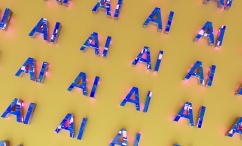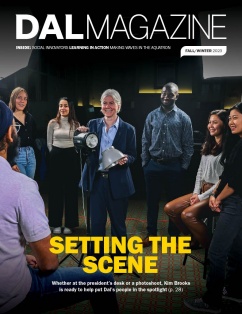Kate CraneŌĆÖs advice to professors worried about new artificial intelligence (AI) tools comes down to two simple words: donŌĆÖt panic.
An educational developer with DalŌĆÖs Centre for Learning and Teaching (CLT), Crane says, ŌĆ£I would just want to remind professors that they should prepare, but they donŌĆÖt necessarily have to turn their worlds upside down.ŌĆØ
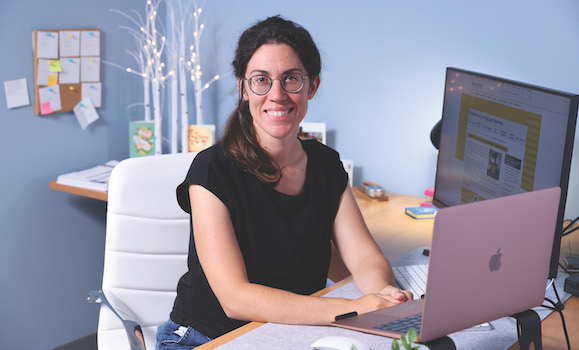
Kate Crane, educational developer (Nick Pearce photo).
Sometimes it feels like everything, not just teaching, is being turned upside-down by new generative AI tools.
Media are experimenting with articles written and illustrated by AI. Sometimes this goes wrong, as when Microsoft made the news for apparently AI-written travel articles that recommended Ottawa tourists visit a food bank ŌĆ£on an empty stomach.ŌĆØ Meanwhile, search engines and blogging tools are incorporating AI assistants and chatbots, and photo-enhancing software is using AI to blur the lines between reality and touch-up more than ever.
And your feeds are likely full of AI images, some of them passing themselves off as real. (No, those babies are not really parachuting, and that isnŌĆÖt Van Gogh sitting on the front steps of his house at Arles.)
But what does it all mean for teaching, learning, and academic integrity? Does widespread adoption of ChatGPT mean the end of the essay as a meaningful evaluation tool? Are DalŌĆÖs academic integrity officers about to be swamped? And should professors ban AI, incorporate it, or embrace it?
A pedagogical problem and an integrity issue
In an online workshop held earlier this year, Computer Science professor Christian Blouin said AI tools like ChatGPT represent ŌĆ£a pedagogical problem that has a short-term academic integrity issue ŌĆö and we need to sort ourselves out very quickly.ŌĆØ Dr. Blouin is DalŌĆÖs institutional lead for AI strategy, and he says it doesnŌĆÖt make sense for a university with as many programs and disciplines as Dal to have one blanket policy on acceptable use of AI by students.
Related reading:╠²Dal's AI lead aims to spark conversation and connection on our rapidly evolving information future (Dal News, July 25)
ŌĆ£In computer science, weŌĆÖre thinking about AI-driven tools differently than in engineering, for example,ŌĆØ Dr. Blouin said in an interview. Meanwhile, in the arts and social sciences, ŌĆ£We are assessing critical thinking, but the medium through which we do that is writing.ŌĆØ
The discussion around AI tools quickly draws us from specifics to big-picture questions: What are universities for? What is the purpose of assignments? What are we assessing and evaluating?
When it comes to essays, for instance, ŌĆ£The point is not so much that you wrote something, but the process of thinking, and the process of articulating whatŌĆÖs underneath,ŌĆØ Dr. Blouin says. ŌĆ£A tool is not an agent, itŌĆÖs not a person... People come to university so they can become citizens and professionals. And itŌĆÖs really important that we provide them with an education and give them an assessment of their abilities in making decisions, and reasoning through, and thinking ethically.ŌĆØ
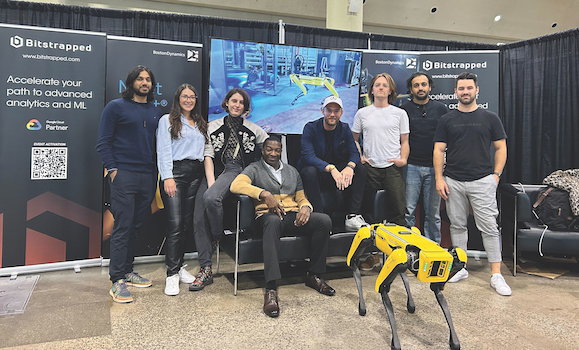
Jesse Albiston, pictured on the sofa wearing a cap, with colleagues from Bitstrapped and a robot dog.
AI in the workplace
Jesse Albiston (BCommŌĆÖ14) is a founder and partner at , a Toronto-based consulting firm specializing in machine learning operations and data platforms. In short, they help companies figure out if and how they should be using AI.
The AI revolution has been good for Bitstrapped. Albiston says the company booked more work in the first quarter of this year than all of the previous year. At the same time, he cautions against jumping on the AI bandwagon just because thatŌĆÖs what everyone else is doing. When the firm is approached by clients who want to integrate AI into their workflows, ŌĆ£Half the time ŌĆö maybe more than half the time ŌĆö AI is not the right approach,ŌĆØ he says.
At the same time, he thinks learning how to use these tools should be an essential part of a university education ŌĆö at least in some fields ŌĆö because they are going to be an essential part of the workplace.
ŌĆ£If someone graduates university today, they should be using these tools. YouŌĆÖre not going to be replaced by AI. YouŌĆÖre going to be replaced by people using these tools,ŌĆØ Albiston says. ŌĆ£In my company, I have employees one or two years out of university who are using these tools, and their output is fantastic. They just need a bit of coaching on how it works.ŌĆØ
But if they ŌĆ£just need a bit of coaching,ŌĆØ is that something a university should be providing? Dr. Blouin is not so sure. He says graduates will definitely encounter AI integrated into tools like office suites. But universities should take a longer-term view, preparing students for careers that will last decades. (How many of us learned high school tech skills we never used again, because technology had moved on?) That means thinking beyond ChatGPT and related large language model (LLM) tools.
Even if professors do want to integrate tools like ChatGPT, Crane says they should proceed with caution. While she believes ŌĆ£experimentation is good,ŌĆØ she notes that at Dal, instructors are not allowed to require students to use AI for coursework. Apart from any pedagogical concerns, ŌĆ£There are data privacy concerns,ŌĆØ she says. The CLT says on its website that making the use of AI tools mandatory for a class contravenes Nova Scotia privacy law and DalhousieŌĆÖs Protection of Personal Information Policy.
Process over output
English professor Rohan Maitzen, who teaches both literature and writing, feels ŌĆ£resentment towards the people who are propagating these systems on us without our permission.ŌĆØ Teaching and learning writing is more about process than output, she says. And ChatGPT canŌĆÖt help with that. But because it offers the promise of producing passable essays quickly and easily, Dr. Maitzen says she and her colleagues are worried.
ŌĆ£We canŌĆÖt ignore the fact that this is a tool designed to take over the writing process,ŌĆØ says Dr. Maitzen.
ŌĆ£Right from the moment you think, ŌĆśWhat am I even going to write about?ŌĆÖ that begins your own individual process of figuring something out and putting your mind in contact with it. You canŌĆÖt outsource that work to a machine. ItŌĆÖs an act of communication between you and the person youŌĆÖre writing for.ŌĆØ
Dr. Maitzen has already received at least one assignment written by ChatGPT. One of the toolŌĆÖs well-known shortcomings is that it is known to make up information, such as false citations and inaccurate ŌĆ£facts.ŌĆØ She assigned a reflection on a short poem and received an essay with one critical problem: ŌĆ£The quotations the paper included were not in the poem. They donŌĆÖt exist at all,ŌĆØ Dr. Maitzen says. ŌĆ£So it wasnŌĆÖt a mystery looking at this paper ŌĆö and looking at the relatively short poem that the paper was supposed to be about ŌĆö there was just no correlation whatsoever.ŌĆØ
Avoiding an arms race
This, of course, brings up the question of cheating and academic integrity. Bob Mann is the manager of discipline appeals for the university secretariat. He said the number of cases referred to academic integrity officers has ŌĆ£gone up dramaticallyŌĆØ in the last few yearsŌĆöalthough that might be because of greater detection. Mann said sometimes students are deliberately cheating, but often they ŌĆ£are just trying to figure things outŌĆØ and ŌĆ£inadvertently commit offences.ŌĆØ
He expects AI tools to make him busier this year. ŌĆ£I call it Napster for homework,ŌĆØ he says. But it wonŌĆÖt necessitate a change in academic integrity rules. ŌĆ£Writing a paper using AI is not a specific offence we have on the books; a student is required to submit work that is their own. So the rules have not changed.ŌĆØ
But determining what constitutes a studentŌĆÖs own work has (with exceptions, like the AI fabricated quotes Dr. Maitzen mentioned earlier) become harder. In terms of enforcement, Mann cautions against assuming students are using AI, saying he has seen cases where accusations proved to be unfounded. Students who struggle with English or who donŌĆÖt understand how to cite properly may be particularly vulnerable to these charges.
And while it might seem tempting to deploy ever-more-sophisticated tools to crack down, everyone interviewed for this story counselled against that approach.
On a basic level, if you are ŌĆ£suspicious of generative AI, why are you going to trust another piece of AI software with a decision that can cause harm? It makes no sense from an ethical perspective,ŌĆØ Dr. Blouin says.
Dr. Maitzen agrees and says ŌĆ£focusing on this as a discipline-and-punish problem is maybe counterproductive.ŌĆØ Plus, she has no interest in an AI arms race with students.
ŌĆ£It isnŌĆÖt just about an enforcement problem. We would like to trust them, and we would like to engage with them in the spirit of trust and authenticity. And so we want them to understand what it is weŌĆÖre really asking them to do, rather than just emphasizing what weŌĆÖre telling them not to do,ŌĆØ she said.
Les T. Johnson, who, like Crane, is an educational developer at the CLT, also emphasizes conversation. He says, ŌĆ£I would want to make sure I had an honest conversation with my students about [AI].ŌĆØ
Crane agrees: ŌĆ£Talk to your students about implications of AI, for themselves, their communities, their learning, society.ŌĆØ
ŌĆ£Artificial intelligenceŌĆØ is not intelligent
A small number of students have always found ways to cheat or cut corners on assignments. They could copy passages out of books, hire people to write papers for them, buy essays online, and use any number of other tools. What AI has done is made it that much easier for students to use outside helpŌĆöwhether or not sanctioned by their professors.
But not that easy.
Despite the term ŌĆ£artificial intelligenceŌĆØ there is nothing intelligent about ChatGPT and other LLMs. They recognize patterns and can create coherent sentences. That doesnŌĆÖt mean students can always rely on them to write a decent essay. ŌĆ£It isnŌĆÖt actually quite so easy as just logging on, putting in your assignment prompt, and itŌĆÖll just give you exactly what you need to get a C or above,ŌĆØ Crane says. ŌĆ£It takes some competency to get what you want out of it, and that takes time.ŌĆØ
Dr. Johnson has noticed professors seem less worried about students turning in AI-generated assignments than they were six months ago. That may be because a lot of students tried them and found them lacking. ŌĆ£I was thinking about ChatGPT in particular. When it first started, it was, ŌĆśOh my gosh, how exciting! I can have this computer write my essay!ŌĆÖŌĆØ he says. ŌĆ£But of the students who used it, some may have been cited for plagiarism and then some just didnŌĆÖt get good grades. And theyŌĆÖre like, well, wait a second ŌĆö I didnŌĆÖt learn anything, I didnŌĆÖt even do that well, and it wasnŌĆÖt that much easier... IŌĆÖm just going to do it myself.ŌĆØ
Dr. Maitzen doesnŌĆÖt blame students who are anxious about grades. TheyŌĆÖve grown up in a culture that increasingly tends to view university education as a commodity. ŌĆ£They donŌĆÖt have a sense that itŌĆÖs all right to take a risk, to just give it a try, to just say what they think,ŌĆØ Dr. Maitzen says. ŌĆ£TheyŌĆÖre not sure they have the skills to do that, and they donŌĆÖt have enough metacognition to realize that doing it online is exactly what prevents them from developing those skills ŌĆö and it becomes a self-fulfilling prophecy.ŌĆØ
Related reading:╠²Ask the experts: Where will artificial intelligence go next? (Dal News, June 5)
How broken are our courses?
Dr. Blouin said the Faculty of Computer Science hired a graduate student over the summer ŌĆ£to assess, if we change nothing in our curriculum, how broken our courses are.ŌĆØ Essentially, how far could students get using AI for assignments, without actually understanding any of the material or learning anything?
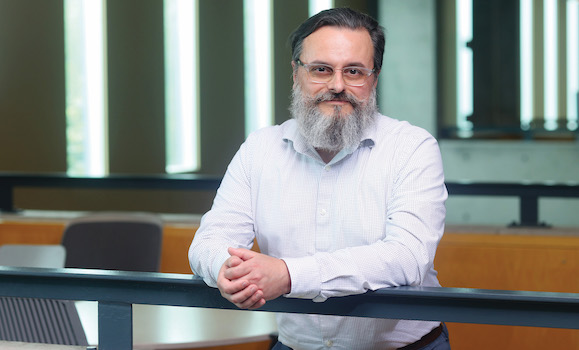
Dr.┬ĀChristian Blouin (Nick Pearce photo).
In some cases, pretty far. ŌĆ£GPT is a pretty good programmer for simple stuff,ŌĆØ Dr. Blouin says. What the faculty found anecdotally was a lot of variation. ŌĆ£There are some third-year assignments that it does very well, and some first-year questions on which it falls apart very quickly.ŌĆØ One approach would be to rejig assignments that can be done by ChatGPT, but Dr. Blouin calls that ŌĆ£a dangerous game to play, because as soon as a new version comes out, your entire strategy may fall apart.ŌĆØ
Despite the AI revolution, Dr. Blouin says one fundamental thing has not changed: ŌĆ£You are intellectually responsible for the work that you produce.ŌĆØ And ŌĆ£universities should not be satisfied with something that looks like work. We are satisfied with and expect actual work from our students,ŌĆØ he says. ŌĆ£So I think itŌĆÖs more an issue of personal and professional responsibility than it is of honesty.ŌĆØ
Still, Dr. Maitzen is planning on making some changes to her assignments, especially for larger introductory classes. That may mean more contract grading, in-class writing, and multiple-choice tests. (She is less worried about her upper-level Victorian literature courses.)
But she is hoping that honest conversations with students about getting the most out of university will carry the day. Crane agrees with that approach. A good assessment isnŌĆÖt suddenly bad because there is a possibility AI could help with it. She urges faculty to ŌĆ£keep designing good assessments according to evidence-based practice.ŌĆØ
This story appeared in the┬ĀDAL Magazine Fall/Winter 2023┬Āissue. Flip through the rest of the issue using the links below.

